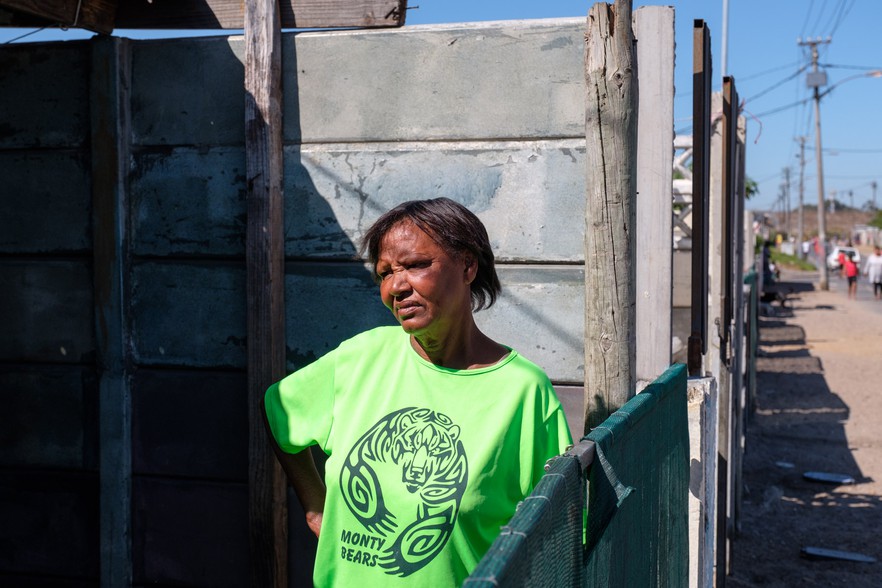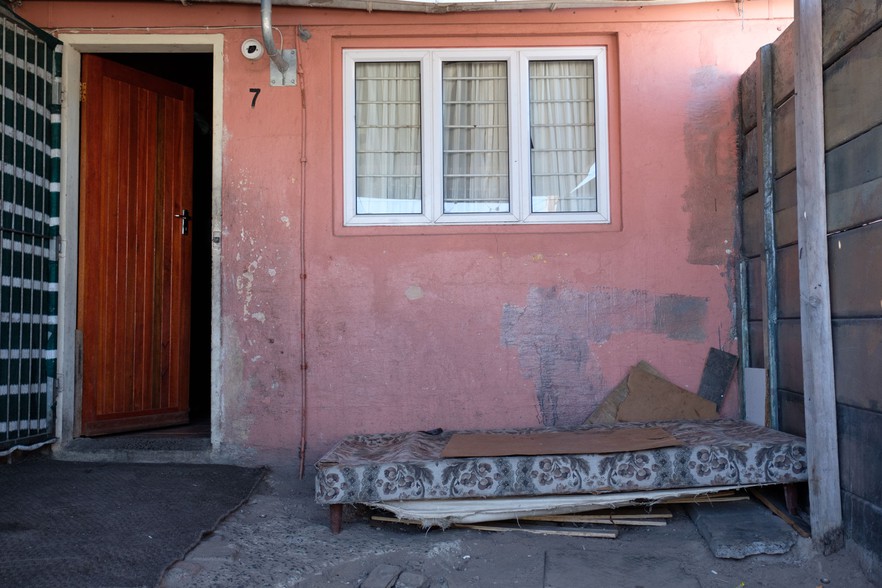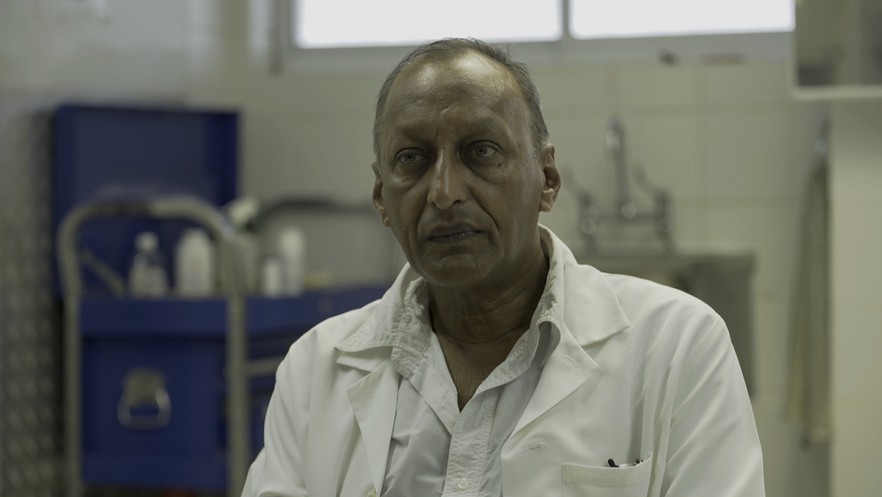Covid-19: Police watchdog investigation of first lockdown death reveals deep flaws
“How can they say that he just dropped dead?” asks his stepdaughter after witnesses describe how Petrus Miggels was beaten by police
Is the Independent Police investigative Directorate (IPID) using autopsy findings of “natural causes” as a way to short circuit police brutality investigations? The decision to clear police of wrongdoing in the circumstances leading up to the death of Petrus Miggels in Ravensmead on the first day of lockdown raises questions about the police watchdog’s processes.
Petrus “Pietman” Miggels’s casket was open when his family said their final goodbyes at home in Ravensmead on the Thursday before Easter.
On the coffin lid, below the open hatch, there was the date on which he was born (14 December 1964) and the date on which he died (27 March 2020), the first day of South Africa’s national Covid-19 lockdown. A funeral was an expense that a poor family could ill afford; so too was losing a breadwinner.
Earlier in the day that Miggels died, his neighbour had reportedly given him R100 with which to buy quarts of beer from a nearby tavern. The transaction was prohibited by lockdown regulations. Nevertheless, Miggels set out on foot. On his way back to his house on Carnation Road, he was intercepted by two police officers on patrol to enforce the first day of the lockdown.
Petrus Miggels was laid to rest on 9 April 2020. Photo: supplied
Three eyewitnesses gave a substantially consistent account of the police’s confrontation with Miggels. We have agreed not to name them as a precaution to protect their safety.
The officers sped up in their vehicle to intercept Miggels and then slammed on the brakes. The driver jumped out with a hammer in his hand. He swore at Miggels and said something to the effect of “you people do not want to listen” and “where did you get the wine”. Miggels, a packet with beer bottles in his hand, stood frozen on the spot and did not speak. The officer walked up to Miggels and tried to pry the packet from his hand. When Miggels did not let go, the officer started to hit his knuckles with the hammer. One eyewitness described the assault with the hammer as punitive. Like, she said, a teacher forcing a child to present his hands, palms down, for a thumping.
Neighbours watching from their stoeps shouted at the police that they should stop hitting Miggels and let him go. Miggels was known in Ravensmead as a shy and sensitive man and the neighbours felt protective about him.
But the police wanted Miggels to disclose where he had bought the beer. A second police officer had gotten out of the passenger side of the police car and grabbed Miggels, dragged him toward the vehicle and forced him into the front seat. The officers got back into the car and drove away. (Reports at the time that Miggels was also shocked with a taser during this assault could not be corroborated by any of the three witnesses interviewed.)
It is not clear what happened in the vehicle. But a short while later Miggels was dropped off near where he had been picked up. From there he walked to his house on Carnation Road. He died on the stoep within the hour.
The mattress on which Petrus “Pietman” Miggels was sitting before he stood up, collapsed and died at his home. Photo: Barry Christianson / New Frame
Because of reports of the prior assault, the Independent Police Investigative Directorate (IPID) — the police watchdog — sent an investigator to Ravensmead the next day to meet the family and to interrogate the circumstances of Miggels’ death.
Then on 1 April, on the fifth day after the death, the investigator called Valene Meintjies, Miggels’ stepdaughter, to inform her that the autopsy had shown her stepfather had died from “natural causes” and that IPID would close its file as a result. Log records on Meintjies’ phone indicate that the call lasted 1 minute and 41 seconds. Days later Meintjies was still asking the investigator for a proper explanation.
“What does this mean for the investigation going forward?” she asked in one message.
“I must properly explain to my mother (Miggels’ life partner Cecilia) because she does not understand,” she said in another message.
The investigator did not respond to these messages, though WhatsApp’s “blue ticks” indicate that they were read.
“How can they say that he just dropped dead?” asks Meintjies. “How can there be no consequences for police who beat an aging man just moments before he died?”
By then it had been widely reported that Miggels had been assaulted by police on the day he died. He had told Valene as much when he stood trembling in the doorway of her backyard shack, minutes before collapsing and dying on the stoep of the main house.
The death took on a particular symbolism after videos purporting to show violent abuses by police during the first weekend of lockdown enforcement started to circulate online.
Minister of Police Bheki Cele. Archive photo: Ashraf Hendricks
On 2 April, Police Minister Bheki Cele spoke live on national television on this and other cases. “I will request that people that write about these things also check their facts, or they wait until the actual facts come,” he said, speaking at a National Command Council briefing. On the Miggels case, he said the post-mortem showed that he had been killed by a heart attack, “not by the police.”
Cele had been briefed by IPID, which had used the autopsy’s finding of double heart failure – a “natural cause” of death – as the basis for closing its file. In so doing it accomplished two things: it exonerated the police and it reported the case closure as a statistical success to be tabled in its annual report before Parliament in October.
IPID’s habit of completing and closing poorly investigated cases to inflate performance statistics was the subject of a Viewfinder exposé last year.
Like Meintjies’ own requests, Viewfinder’s request for an explanation of IPID’s decision to close the Miggels case, sent to the national spokesman and the Western Cape provincial head, went unanswered.
When a family lawyer requested a copy of the docket — records to which Miggels’ family are entitled — IPID also refused and directed the family to submit a Promotion of Access to Information Act (PAIA) request. At the time of writing, this PAIA request had been submitted, but not granted.
As well as investigating deaths, IPID is tasked to investigate complaints of assaults by the police. Asked whether IPID found the allegations of a police assault on Miggels to be substantiated, spokesman Sontaga Seisa said only: the “information that IPID has is that the deceased was seen getting in a police vehicle and was immediately dropped off by the same police.”
South African law limits the extent to which police may use force. The Criminal Procedure Act states that a police officer may do so to effect an arrest, but only if “the suspect cannot be arrested without the use of force” and only if such force is “reasonably necessary and proportional in the circumstances”. The South African Police Service Act also allows for the police to “use only the minimum force which is reasonable in the circumstances”.
From witness accounts, the circumstances of the police’s confrontation with Miggels did not warrant the assault that they saw. According to IPID Miggels was never formally under arrest, and even if he had been, there is little indication that force would have been necessary to restrain him.
Viewfinder checked with a senior police officer and hammers are not officially sanctioned weapons for use in visible policing, meaning that their use is prohibited.
An eyewitness on the scene of the Miggels assault recognised one of the policemen involved and identified him as an officer at Ravensmead police station. The witness knew the officer by name. Another source interviewed by Viewfinder said that the policeman was widely disliked for his aggression and verbal abuse when on duty.

Petrus “Pietman” Miggels on the left. Zinakile Fica (see grey box below) on the right.
Allegations of abuses by officers at the Ravensmead police station are common, as a string of complaints to IPID show. IPID registered at least 93 such complaints related to assaults by police officers, between April 2012 and March 2019. Many complaints described an excessive use of force. Sometimes police who raided homes were accused of assaulting people without cause. In a case registered in November 2018, police allegedly beat a man “during the execution of a search warrant at the wrong address”. In other incidents, people complained about being beaten by police while in detention. Many complaints involve slaps, punches, kicks or choking. In some instances police were accused of using implements such as a belt and a broomstick to assault a detainee in a cell (October 2013), or the butt of a shotgun to hit a suspect’s knees during interrogation (December 2014), or a sjambok used to augment a beating with “closed fists” (July 2018).
In at least three cases, officers are accused of pointing firearms at the victim’s head during the assault. In one case, from February 2014, a female officer was accused of putting the barrel of a gun in the mouth of a nine-year-old boy while she was assaulting and “disciplining” him at the back of the station.
Very few of these cases have led to IPID making criminal or disciplinary recommendations against the alleged offenders, the directorate’s data shows. And in none of those which were referred for prosecution was there a criminal or disciplinary conviction.
For the country as a whole, IPID has registered more than 25,000 assault cases against the police between 2012 and 2019, a number which has inundated the poorly-resourced directorate. Investigations of assault resulted in fewer than 170 criminal convictions and about 780 disciplinary convictions during that same period, a ratio between intake and conviction of less than 25 to 1.
In susceptible people, for instance people with underlying heart conditions, physical trauma can trigger a heart attack. The closure of the Miggels and Fica cases (see sidebar) raises a red flag over the way the finding of “natural causes” may potentially be used to short circuit an inquiry into cases where police brutality may have occurred. Between 2012 and 2019, IPID attributed at least 454 deaths in custody as having arisen from “natural causes”. The overwhelming majority of these cases were completed or closed with no adverse findings against the police.
On Wednesday, IPID will appear before the Parliamentary Portfolio Committee on Policing. It will brief the committee on investigations of alleged police brutality during lockdown enforcement. In this round-up, the Petrus Miggels case may be reported by IPID as a success. Case closed.
Assault or torture can trigger a heart attack: the case of Zinakile Fica
It is well-known in pathology that physical trauma, especially when combined with a pre-existing heart condition, can trigger a heart attack in a person. The effects of a sudden adrenaline surge brought on by an intense experience, such as being unexpectedly assaulted, can also have a delayed effect in causing a heart attack.
In cases where police assault may have preceded a death, a finding of a “natural” cause of death does not necessarily absolve the police of all wrongdoing, says forensic pathologist Dr. Steve Naidoo.
Naidoo has decades of experience in analysing custody and police action related deaths in South Africa. He testified as an expert witness in the recent inquests into the deaths of Neil Aggett and Ahmed Timol, both of whom died in police custody at John Vorster Square, in Johannesburg, during apartheid.
He believes autopsy findings should be interpreted in light of circumstantial evidence, for a fuller understanding of why deaths occurred. He believes, for instance, that where heart failure may present as the direct “structural” or “biological” cause of death to a pathologist, the underlying circumstances which preceded the death should not be overlooked during an investigation.
In 2014, he conducted a private, second autopsy on the body of Zinakile Fica, a 41-year-old man who died in police custody in Prospecton, south of Durban.
It appears that a state pathologist had previously found that Fica had died of a heart attack, and this may have been cause enough for the investigator to have concluded that the death was due to “natural causes” (as it was recorded in IPID’s intake register that year).
In any event, at the time in 2014, there is no record in IPID’s registers that it recommended prosecution or disciplinary action against police officers who were present in the room when Fica died. Yet, IPID reported the case as a statistical success twice over. Firstly, because it was completed and secondly because it was completed quickly, within a 90-day target. The dangers of IPID’s push for quantity and quick turn-around in pursuit of performance targets was the subject of Viewfinder’s exposé on the directorate last year.
Forensic Pathologist Steve Naidoo. Photo: Anton Scholtz
Then Naidoo’s autopsy report was published. It drew on witness statements to conclude that Fica was almost certainly being “tubed” – a common form of police torture wherein officers repeatedly suffocate suspects to the point of blackout – when he suffered a heart attack. Where the heart attack was the direct cause of death, Naidoo concluded that it was “very likely induced by a most severe physiological stress of near-asphyxiation”.
Though the IPID investigator was present at Naidoo’s autopsy on Fica, she did not wait for his report to be published before formally “completing” her investigation.
Naidoo’s finding exposed shortcomings in IPID’s initial investigation of the Fica case. In light of these shortcomings, national head of investigations Matthews Sesoko reported to Viewfinder last year that IPID had decided to relook at the case and had moved the investigation from KwaZulu-Natal to head office in Pretoria. Sesoko has since been suspended and IPID failed to respond to a request for an update.
Next: Covid-19 grant: We can learn from Namibia
Previous: Covid-19: “At least something good came out of this lockdown” says settlement resident
© 2020 Viewfinder and GroundUp.
This article is not published under our usual Creative Commons license. Please contact Viewfinder for permission to republish.







